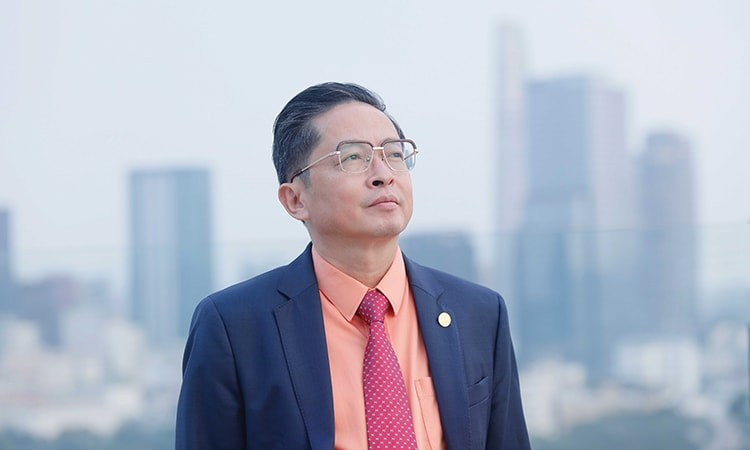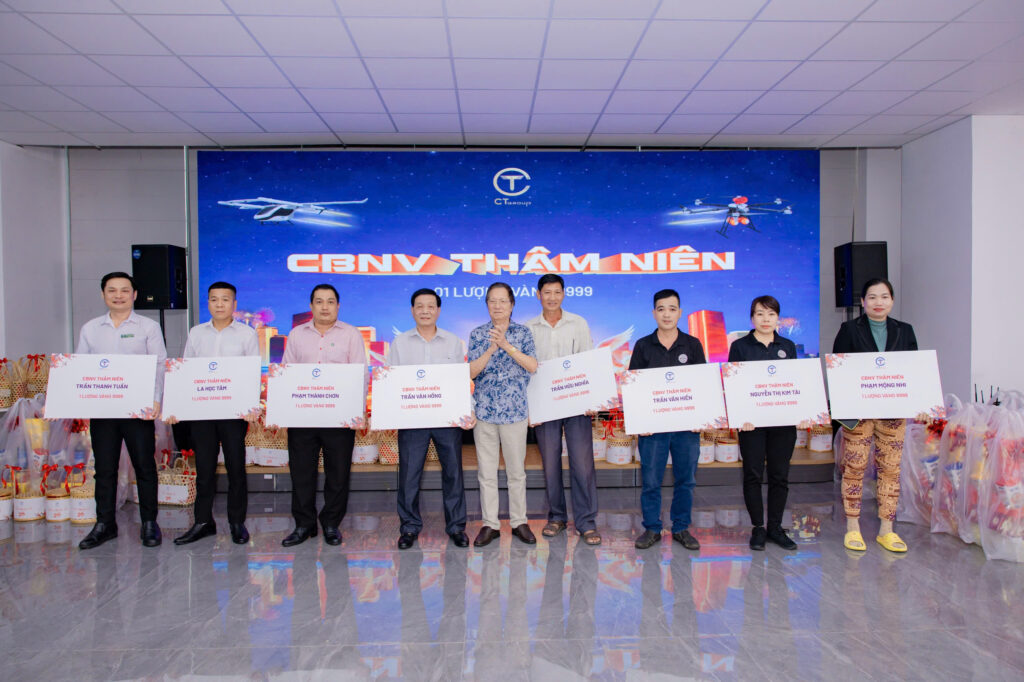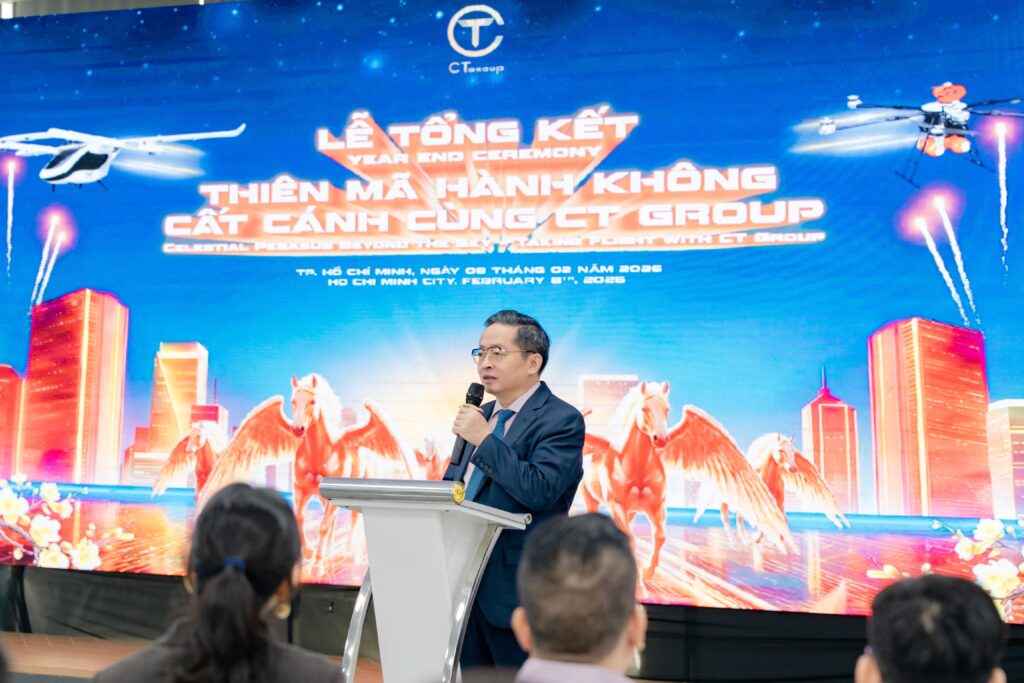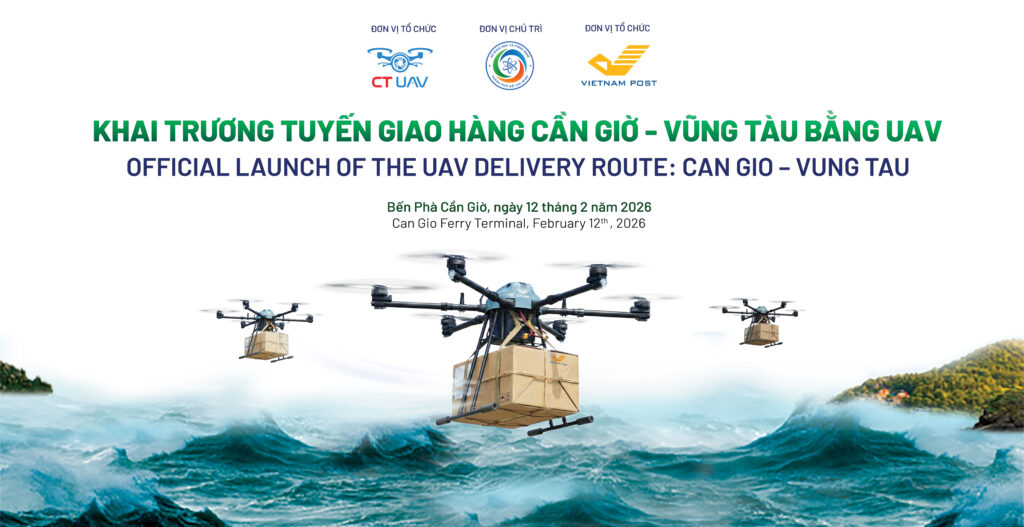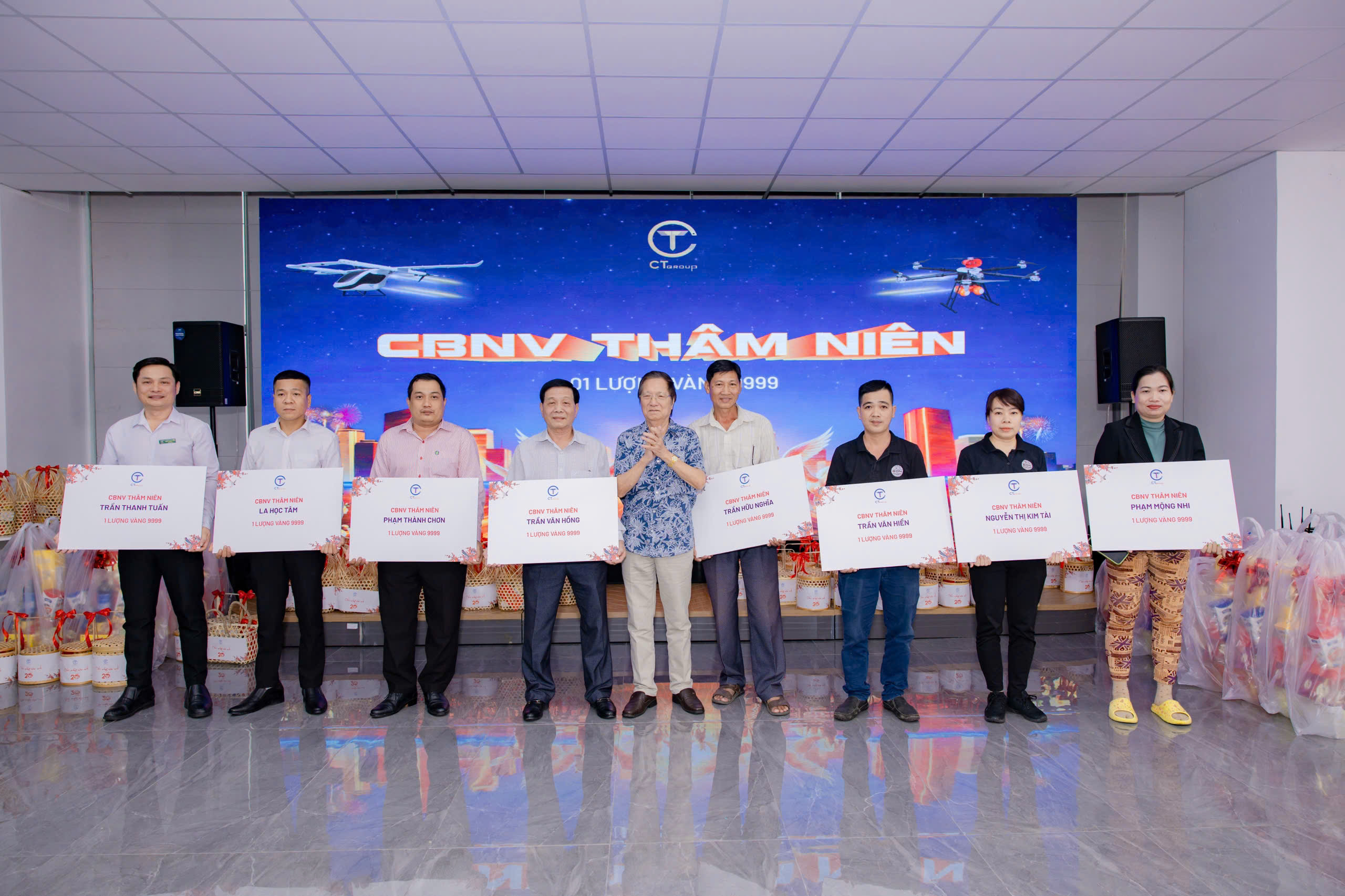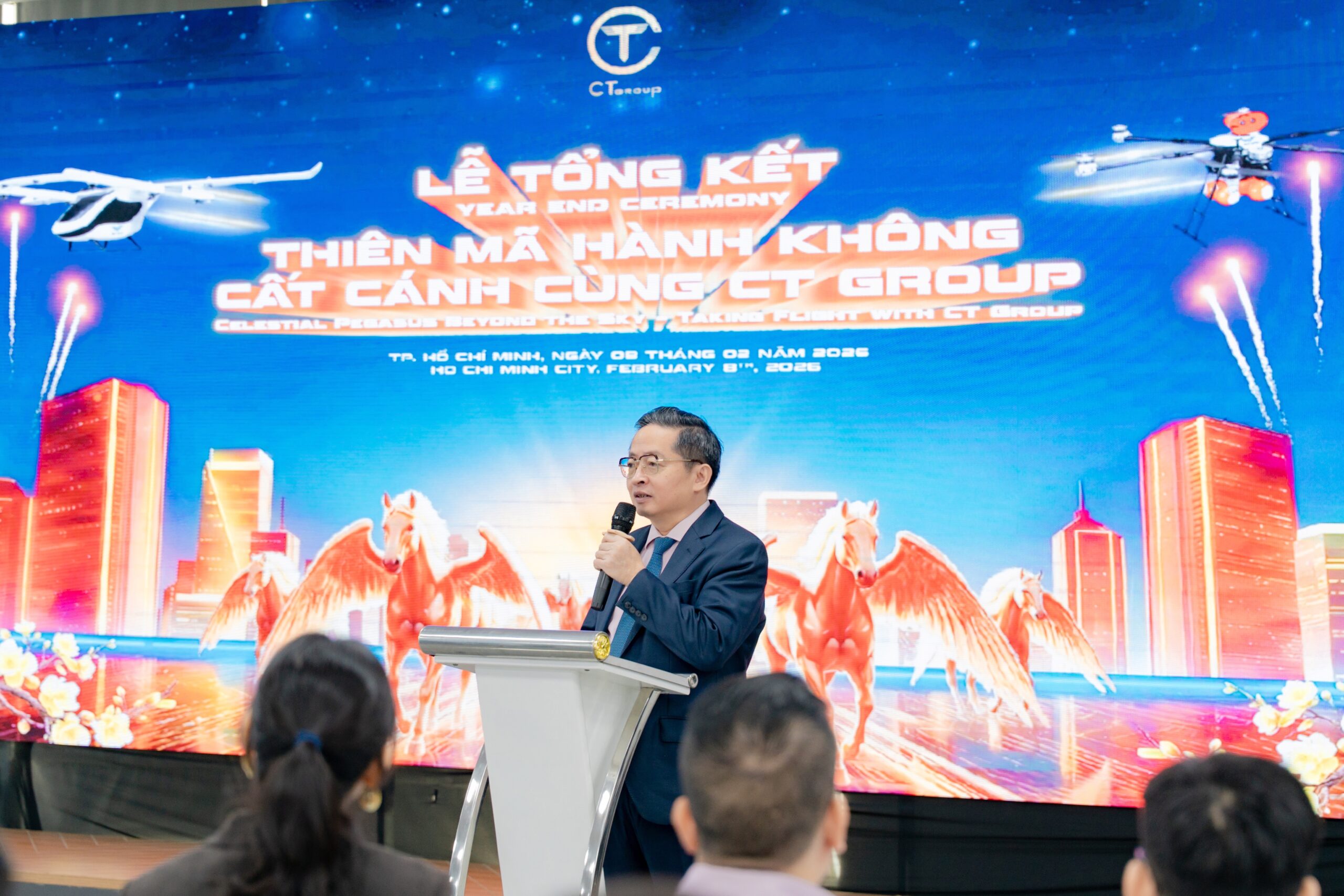TECHNOLOGY DIPLOMACY: VIETNAM’S SOFT POWER IN THE DIGITAL ERA
From a country once absent from the world map, after 80 years, Vietnam has become one of the 34 largest economies in the world and is recognized as one of the leading potential technology hubs in Southeast Asia. In this new era, the era of national rise , international integration is considered a “breakthrough policy,” a key driving force that contributes to positioning the country alongside the great powers of the world.
International integration is shifting from receiving to contributing, from deep and broad integration to comprehensive integration, from being a latecomer to becoming a nation that rises and pioneers new fields, asserting its position and capacity in the global value chain. In this context, technology diplomacy is regarded as Vietnam’s “soft power” in the digital era.
Globalization (Go Global) is an inevitable trend, but for Vietnamese businesses to reach out to the world, they cannot rely solely on their internal strengths. With breakthrough resolutions on technological innovation and with the support of ministries, departments, sectors, and embassies, Vietnamese enterprises now have a solid “foundation” on their journey to fulfill the mission of technology diplomacy. However, to implement the international cooperation strategy in technology, there is still much work to be done.
“Vietnamese enterprises now have a solid “foundation”, however, to implement the international cooperation strategy in technology, there is still much work to be done.”
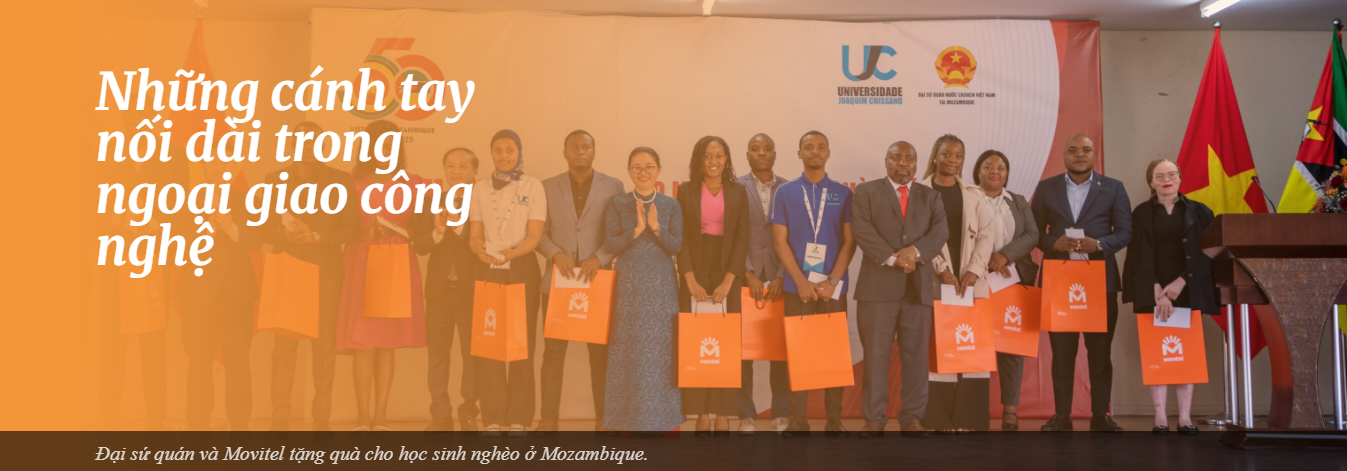
Text in picture:
EXTENDED ARMS IN TECHNOLOGY DIPLOMACY
THE EMBASSY AND MOVITEL PRESENT GIFTS TO DISADVANTAGED STUDENTS IN MOZAMBIQUE
Resolution No. 57-NQ/TW of the Politburo on breakthroughs in developing science, technology, innovation, and national digital transformation sets the goal for the 2025–2035 period, with a vision to 2045, to make Vietnam a regional innovation hub, to promote the export of high-tech products, and to form a modern digital ecosystem. To realize this goal, close coordination between domestic and international efforts is essential.
In implementing Resolution No. 57-NQ/TW, embassies are not only expected to “pave the way” but also to truly “accompany” businesses in every stage of development, linking business interests with the effectiveness of bilateral relations and the nation’s reputation.
According to Ambassador Tran Thi Thu Thin, in line with the spirit of Resolution No. 57-NQ/TW of the Politburo on promoting the pioneering role of foreign affairs in economic development, the Vietnamese Embassy in Mozambique identifies building and consolidating trust and friendship between the two countries across all channels as a key task, considering it a “strategic asset” of diplomacy.
“In implementing Resolution No. 57-NQ/TW, embassies are not only expected to “pave the way” but also to truly “accompany” businesses in every stage of development, linking business interests with the effectiveness of bilateral relations and the nation’s reputation.”
Ambassador Tran Thi Thu Thin noted that Vietnam must recognize that when businesses invest in distant and challenging regions such as African countries, they face high risks and require long-term commitments. Therefore, the Government and relevant ministries and agencies need to build long-term strategic support mechanisms.
“In addition to improving approval and licensing procedures, it is necessary to study and apply risk insurance tools, and credit incentives, while actively negotiating and signing investment protection and double taxation avoidance agreements with African nations. These are practical measures to protect the rights and encourage long-term investment confidence for businesses”, shared Ambassador Tran Thi Thu Thin.
Bringing Vietnamese high-tech products into the U.S. market is a strategic goal set out in Resolution No. 57-NQ/TW. However, this is a market with stringent technical standards and high-quality requirements. Mr. Hoang Anh Tuan, Consul General of Vietnam in San Francisco, stated that the Consulate has been supporting businesses by organizing product introduction programs, specialized trade fairs, and direct connections with major distribution and supply chains. Highlighted products include software, AI solutions, IoT devices, and semiconductor chips.
Thanks to this support, some Vietnamese enterprises have achieved initial success in signing cooperation agreements and establishing a presence in the U.S. market. This not only expands the market for Vietnam’s high-tech products but also contributes to increasing the added value of the economy, aligning with the “intellectual export” objective of Resolution No. 57-NQ/TW.
In the context of intense global technological competition, Resolution No. 57-NQ/TW serves as the guiding compass for Vietnam to develop a digital economy and high technology. The Vietnamese Consulate in San Francisco, USA, stated that as Vietnam’s center of technology diplomacy in the U.S., the Consulate has established itself as a “smart bridge” connecting Vietnam with the global innovation ecosystem.
Thanks to its strategic location at the heart of the global innovation hub – home to the world’s leading technology corporations, Consul General Hoang Anh Tuan shared that to develop the digital economy, Vietnam must master technology standards, protect intellectual property, and build an international brand.
“The Consulate General always accompanies Vietnamese enterprises in negotiations, provides market information, supports the resolution of legal and commercial difficulties, thereby helping to minimize risks and enhance competitiveness,” affirmed the Consul General.
Accordingly, from promoting cooperation, connecting enterprises, supporting the export of high-tech products, to mobilizing overseas intellectuals and positioning the national brand, the Consulate General not only performs traditional diplomatic duties but also becomes a driving force for the nation’s digital transformation.
Mr. Hoang Anh Tuan affirmed that Resolution No. 57-NQ/TW clearly defines the mission of positioning the Vietnamese brand as an innovative technology nation. In recent years, through participation and support in global technology events on AI, digital economy, and digital transformation, the Consulate General has contributed to affirming Vietnam’s technological vision and building trust with international technology corporations.
“The communication of the message ‘Vietnam – A Rising Tech Nation’ across social media platforms and major technology conferences in the U.S. has made Vietnam an attractive destination on the global technology investment map. This is the sustainable added value that technology diplomacy brings,” shared Mr. Hoang Anh Tuan.
He also affirmed that with a strategic vision and flexible approach, the Consulate General will continue to accompany Vietnam on its journey to realize the goal of becoming a regional center for technology and innovation by 2045.
In one of the most demanding markets like Japan, Ambassador Pham Quang Hieu of Vietnam to Japan stated that “the extensive strategic partnership for peace and prosperity in Asia between Vietnam and Japan has been comprehensively and practically implemented in all fields, especially marking significant progress in science and technology cooperation, innovation, and digital transformation between the two countries.”
Technology diplomacy in the current and coming period will play a crucial role in the bilateral relationship, as Prime Minister Pham Minh Chinh of Vietnam and the Prime Minister of Japan agreed to make cooperation in science, technology, and innovation a new pillar of the bilateral relationship during the official visit to Vietnam in April 2025. With one country possessing advanced science and technology and another with strong demand for technological innovation and modern technology adoption, technology diplomacy will thus serve as a bridge connecting both nations’ development needs, supporting and complementing each other in research, application, and technological advancement.
“The role of the Government is important, but businesses must also make efforts and contribute even more. To ensure that technology diplomacy develops deeply, the factor of people-to-people diplomacy remains essential.”
For CT Group, the orientation for developing its strategic technology ecosystem has been clearly defined, focusing on nine high-tech industries such as semiconductors, unmanned aerial vehicles (UAV), artificial intelligence, quantum technology, genetics and cellular technology, electric and metro vehicles, new energy, digital green ESG, and three traditional sectors: smart urban development; development of transportation, engineering, economic, and social infrastructure and green logistics; and clean food and healthcare.
Mr. Tran Kim Chung, Chairman of the Board of Directors of CT Group, Honorary Consul of Portugal, Vice President of the Vietnam-Japan Friendship Association in Ho Chi Minh City, and Member of the Scientific Council of the University of Economics Ho Chi Minh City, stated that CT Group is currently mobilizing all resources to prepare for the production of 5,000 aircraft for South Korea. In September, CT Group, in collaboration with its partner Airbility, will test a new aircraft model. Additionally, the company is actively preparing to expand into Indonesia, the Philippines, and further into the United States and Canada.
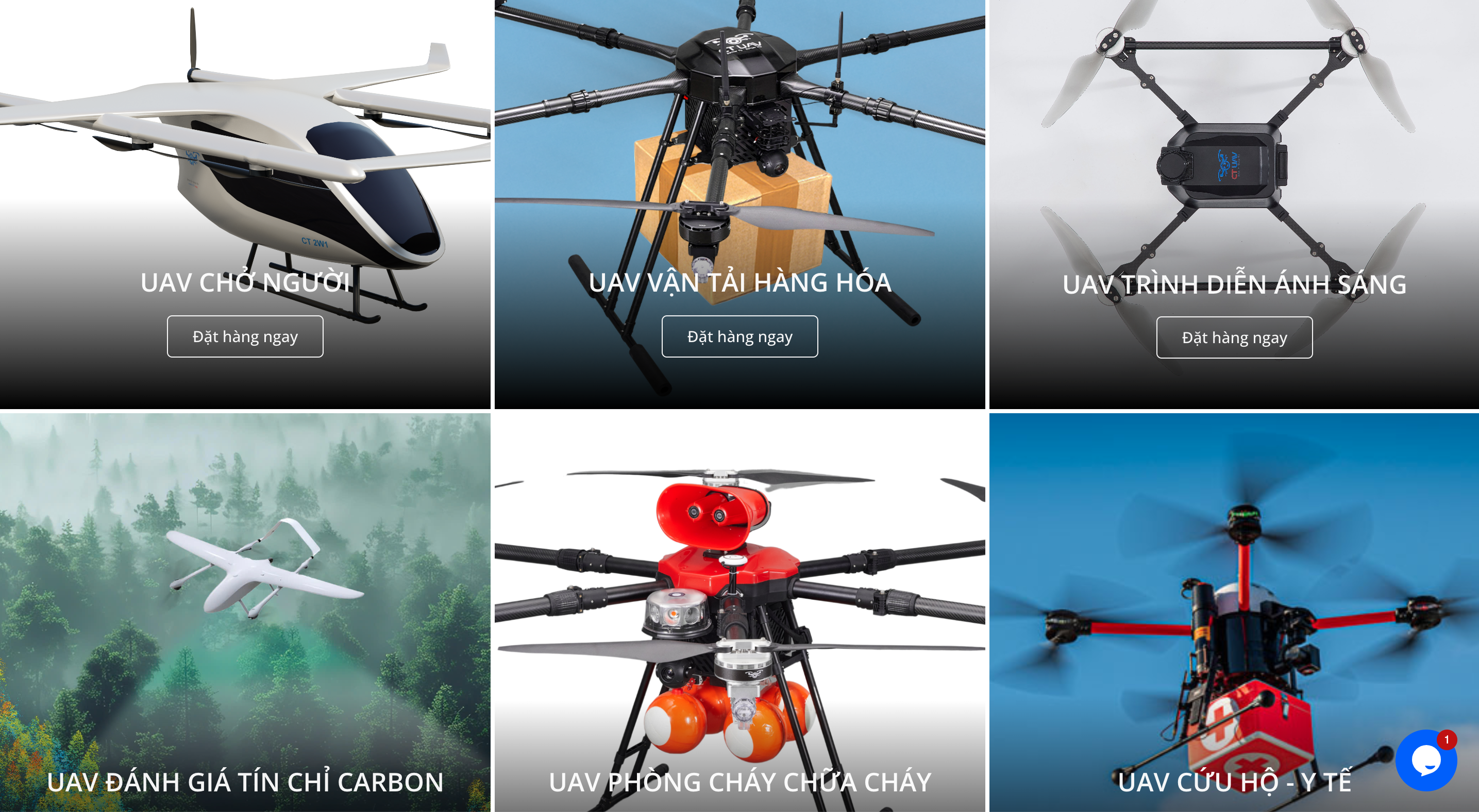
Apart from exporting UAV, CT Group has many other export products in the high-tech sector. The company not only exports aircraft but also exports other cutting-edge technologies on a large scale, such as LAE (Low Altitude Economy), NDT15 (National Digital Twin 15), CTI (CT Innovation 4.0), and regenerative biotechnology. Furthermore, the company is completing research to launch and export green, zero-emission robotic houses.
From the practical “go-global” experience of the enterprise, Mr. Tran Kim Chung made several recommendations to the Government on supporting businesses in developing strategic technologies. He emphasized that in the context of rapidly advancing global technologies, the policy of “turning institutions into advantages” is an excellent initiative of Resolution No. 57-NQ/TW that should be understood and effectively applied. This is the “key” that allows Vietnam to advance faster than other nations.
“In the context of rapidly advancing global technologies, the policy of ‘turning institutions into advantages’ is an excellent initiative of Resolution No. 57-NQ/TW that should be understood and effectively applied.”
Regarding the UAV industry, in the past, authorities lacked technical tools to manage UAVs and thus mainly relied on administrative regulations. CT Group has proposed that the Ministry of National Defense and the Ministry of Public Security jointly establish an inter-agency task force to review and remove outdated regulations to unlock the potential of the low-altitude space economy, an economic sector projected to reach hundreds of billions of USD, similar to China’s booming model. “We propose applying SIM-based identification for UAVs to manage flights through technology instead of administrative procedures while generating revenue from periodic inspections,” Mr. Chung expressed.
CT Group’s Chairman also hopes that the Government will soon implement the NDT15 Technology Platform (15-layer National Digital Twin), which he described as a “magic wand” for accelerating national development and overcoming the middle-income trap. The NDT15 platform could bring more than 250 superior efficiencies across all fields, from comprehensive data and AI-based planning models to digital city management, e-government, and smart agriculture.
Regarding financial resources, Mr. Kim Chung noted that CT Group has not yet received any support in capital or land for technology development. Therefore, he suggested that the simplest immediate action would be to establish a 50/50 guarantee model for selected core technologies for exemplary enterprises.
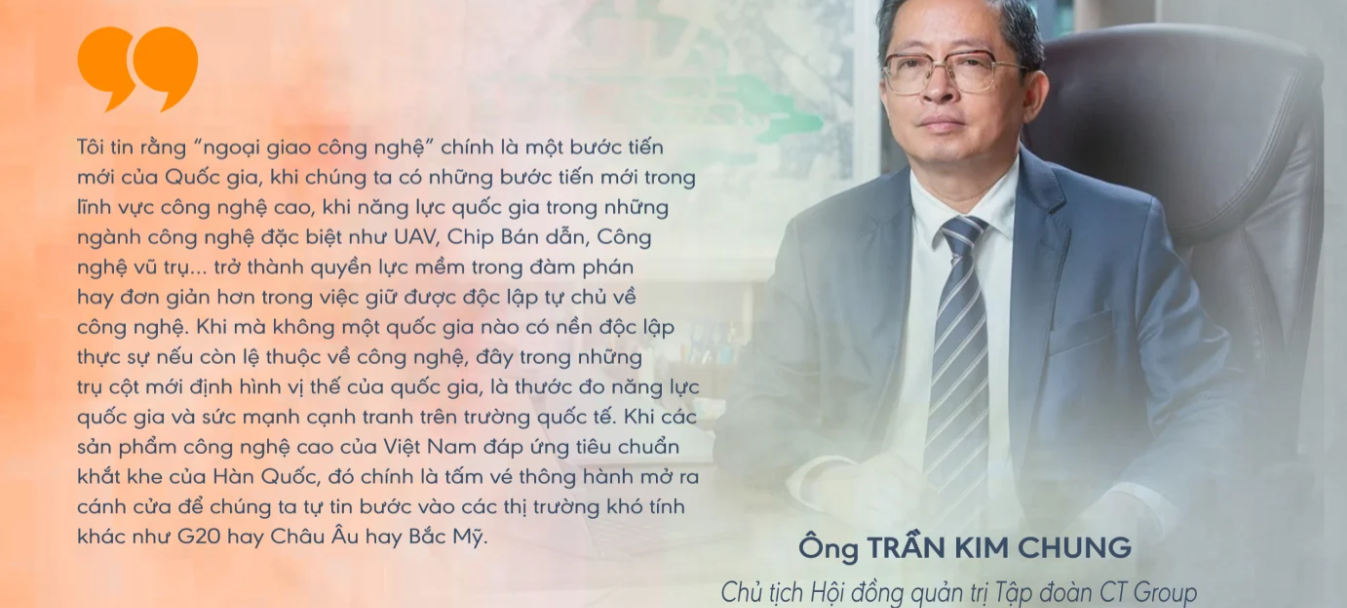
Text in picture:
“I believe that “technology diplomacy” marks a new step forward for the nation as we make new strides in high-tech fields, when national capacity in strategic technologies such as UAVs, semiconductors, and aerospace becomes soft power in negotiations, or more simply, in maintaining technological independence. No country can truly be independent if it remains dependent on foreign technology. This is one of the new pillars defining national position, a measure of national capacity and competitiveness on the international stage. When Vietnam’s high-tech products meet South Korea’s strict standards, that is the passport opening doors for us to confidently enter other demanding markets such as the G20, Europe, or North America.” Mr. TRAN KIM CHUNG, Chairman of of the Board of Directors of CT Group.
Like many other information technology enterprises, CT Group’s Chairman proposed that there should be national programs to build a national brand, especially in science and technology industries where Vietnam is still considered an emerging nation.
“Developing technological products is already difficult, selling agricultural products is even harder, and producing chips is the most challenging of all. Many people never believed Vietnam could make chips, but we have succeeded and started selling them to the market. Therefore, the most essential thing is to build a national brand for technological products. We hope to soon have policies that enhance national capacity in building brand value for technological products and in bringing high-tech products to international markets. As Vietnam enters the high-tech manufacturing era, if we do not prepare a strong global distribution system, producing many technological products without efficient exports will become a major challenge”, shared Mr. Kim Chung.
“Many people never believed Vietnam could make chips, but we have succeeded and started selling them to the market.” – Mr. Tran Kim Chung – Chairman of the Board of Directors, CT Group
CT Group also expressed the desire for closer coordination between the Ministry of Industry and Trade, the Ministry of Foreign Affairs, and related agencies to build national competitiveness and support technology enterprises in reaching international markets. This is a long-term orientation contributing to the effective implementation of Resolution No. 57-NQ/TW, helping Vietnam achieve a high position in the global technology value chain.
According to Ms. Nguyen Minh Hang, Deputy Minister of Foreign Affairs, economic diplomacy has made important and breakthrough progress. This achievement is the crystallization of foundational elements with strategic significance. It stems from profound innovation in thinking and the resolute leadership of the Party. For the first time, economic diplomacy has been included as a policy in the Party Congress’s documents. Economic diplomacy has truly become a key component in all foreign affairs activities, especially at the high-level diplomacy. In the process of upgrading and enhancing relations with partners, the economy has been given top priority and has achieved very specific and practical results, creating new opportunities for national development.
Ms. Hang also emphasized that the scope of economic diplomacy will no longer be limited to trade and investment promotion but will expand into new and more specialized areas such as science and technology diplomacy and green diplomacy. Recently, during the state visit to the Republic of Korea by General Secretary To Lam, a strategic shift was made from economic cooperation to economic linkage, thereby opening new opportunities in mobilizing and attracting resources.
“The scope of economic diplomacy will no longer be limited to trade and investment promotion but will expand into new and more specialized areas such as science and technology diplomacy and green diplomacy…” – Ms. Nguyen Minh Hang, Deputy Minister of Foreign Affairs
International cooperation in science and technology has been increasingly expanded across various fields, including: natural sciences (improving scientific capacity, rational use of natural resources, environmental protection, and sustainable development);
social sciences and humanities (providing scientific arguments to support the formulation of Party guidelines and State policies); science and technology (enhancing growth quality, efficiency, and competitiveness of the economy; strengthening national defense and security; and serving public purposes).
In the past, research cooperation activities were based on each country’s traditional strengths. However, in the current context of complex and unpredictable global cooperation and competition in science and technology, Vietnam is entering a new phase of development with ambitious socio-economic goals.
At present, there are about 10 countries worldwide with outstanding capabilities and leading roles in various technological fields: The United States (artificial intelligence, space technology, biotechnology, cloud/quantum computing, cybersecurity, semiconductors); China (artificial intelligence, 5G/6G, clean energy batteries, rare earths, space technology, semiconductors); Japan (5G/6G, robotics, advanced materials, semiconductor manufacturing equipment and chemicals, space technology);
South Korea (5G/6G, semiconductor memory chips, robotics, energy batteries, artificial intelligence); Germany (robotics/automation, materials and batteries, cloud infrastructure, aerospace); The United Kingdom (artificial intelligence, cybersecurity, biotechnology); France (aerospace, nuclear energy, security); Singapore (applied artificial intelligence, data centers, cloud computing, cybersecurity, fintech); Israel (artificial intelligence, cybersecurity, biomedicine); Canada (quantum technology, deep learning artificial intelligence, materials science, biotechnology).
On June 12, 2025, Prime Minister Pham Minh Chinh signed Decision No. 1131/QD-TTg promulgating the list of strategic technologies and strategic technological products. According to this Decision, Vietnam has 11 groups of strategic technologies and 35 groups of strategic technological products. Vietnam needs to focus on deep development to avoid resource fragmentation and stay closely aligned with these 11 groups of technologies and 35 groups of products.
The Ministry of Science and Technology is currently working with the Ministry of Foreign Affairs to identify countries with leading strengths in these technological fields.
According to Mr. Hoang Huu Hanh, Deputy Director General of the Department of International Cooperation, Ministry of Science and Technology, among the 11 groups of strategic technologies, the Ministry has set two priorities. The first priority focuses on foundational technologies of the Fourth Industrial Revolution and the digital economy, including artificial intelligence (AI), cloud computing, big data, next-generation mobile networks (5G/6G), and cybersecurity. The second priority focuses on fields where Vietnam has potential, competitive advantages, or vital economic-security significance, such as semiconductor chip technology, advanced biomedical technology, energy and new materials technology, and technologies for exploiting strategic resources like rare earths and oceans.
According to Mr. Hoang Huu Hanh, to effectively carry out technology diplomacy in the coming period, Vietnam needs to establish specific evaluation criteria, personnel selection standards, and clear training and capacity-building plans to build a professional, interdisciplinary team of technology diplomats. This workforce must possess strong technological knowledge, a clear understanding of the national technology development strategy, and negotiation and diplomatic skills.
Therefore, for the core personnel, the representative of the Ministry of Science and Technology stated that it is essential to enhance the capabilities of officials who understand strategic technologies (such as artificial intelligence, semiconductors, etc.), have experience in research and R&D promotion, attracting technology centers, and expertise in policy-making and legislation related to intellectual property, export–import controls, and technology assessment and appraisal. They should also have experience connecting cooperation between institutes/universities and foreign partners to implement joint research projects, as well as experience in managing international technology cooperation or research projects.
To develop a high-quality human resource base, recruitment should combine traditional diplomatic channels with targeted selection from the Ministry of Science and Technology’s agencies and universities/research institutes. Fast-track training should be provided in basic engineering, intellectual property, international negotiation, technology appraisal, and technology security.
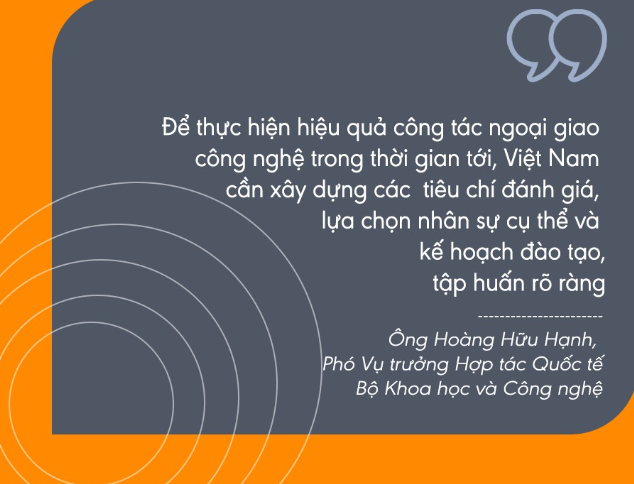
Text in picture:
“To effectively carry out technology diplomacy in the coming period, Vietnam needs to establish specific evaluation criteria, personnel selection standards, and clear training and capacity-building plans.” – Mr. Hoang Huu Hanh, Deputy Director General of International Cooperation, Ministry of Science and Technology
In addition, to attract scientific and technological talent, there must be incentive policies, including competitive remuneration and overseas work allowances.
The Ministry of Science and Technology currently has 23 Science and Technology Representative Offices in 19 countries. These offices act as the extended arms of the Ministry, serving as strategic bridges between Vietnam’s research and innovation system and the global technology ecosystem.
The Science and Technology Representative Offices not only perform technical diplomacy tasks but also conduct market research, identify and support technology transfer opportunities, and attract resources, directly contributing to enhancing endogenous capacity and elevating the national position.
________________________
Follow CT Group on Facebook for the latest updates and news!


